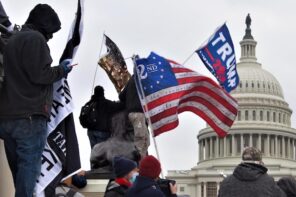UPDATE April 21: On April 20, after this article appeared, the 5th Circuit Court of Appeals reinstated Texas’ ban on all elective abortions, including those induced through medication.
COVID-19 has given Texas Governor Greg Abbott and Attorney General Ken Paxton the chance to do what they’ve long wanted: ban elective abortions in Texas. On March 23, Paxton, with Abbott’s endorsement, declared elective abortion care a non-essential procedure barred under the state’s lockdown, on the dubious grounds that abortion care consumes vital hospital space and personal protective equipment (PPE). Paxton threatened abortion providers with fines or jail time for violating the ban.
Texas’ abortion ban and similar moves by other Republican governors have been widely criticized in the national press and by reproductive rights advocates as a cynical exploitation of the pandemic to further a religious right political agenda.
Pro-choice religious leaders from across Texas echoed that charge in a panel discussion livestreamed last week by Just Texas, a reproductive justice group affiliated with the left-leaning Texas Freedom Network (TFN). They also lodged a perhaps more substantial and often overlooked objection: the ban, like attempts to curtail reproductive choice generally, amounts to an assault on religious freedom.
“It’s an extension of the insistence on one particular theological point of view as the official, governmental theological point of view, which is totally inappropriate,” said Austin Rabbi Alan Freedman, one of the panelists.
That “official theology” has long been evident at the highest reaches of Texas state government. Abbott, a Roman Catholic with Christian nationalist leanings, has made no secret of his opposition to abortion. At a 2016 anti-abortion gathering, he vowed to make Texas “the strongest pro-life state in the United States of America.” Paxton, a Baptist, has made false and tendentious claims about the risks of abortion, and for years has tried to limit abortion access in Texas. So it wasn’t surprising that they incorporated an abortion ban into the state’s COVID-19 lockdown.
Reproductive rights groups sued the state in federal court, arguing that the ban is unconstitutional and that it should exclude medication abortion, a two-pill process that can be used up to 10 weeks of gestation and that requires no hospital space or PPE. There followed “a series of dizzying legal twists and turns” in which the ban was blocked, reinstated, then blocked again. On April 13, the conservative 5th Circuit Court ruled that medication abortion is permitted but continued the ban on elective surgical abortion.
The Just Texas panel discussion, moderated by TFN’s Rev. Erika Forbes, took place the day after the 5th Circuit decision. Though panelists welcomed the ruling, Rev. Deneen Robinson of the Dallas Afiya Center, a reproductive justice organization serving Black women and girls, characterized it as inadequate. For many of the people she serves, she said, “medication abortion is not an option” because they’ve already passed the 10-week limit by the time they arrive at her center. Robinson and Rabbi Freedman also noted that the continuing ban on surgical abortion forces women to make lengthy trips out of state, where they and their family members could potentially be exposed to COVID-19 and then bring it back to their communities. That “totally undercuts the moral argument” behind the ban, Freedman said.
Besides the hardships the ban places on women, panelists said, it also violates Texans’ religious freedom. Rev. Amelia Fulbright of Austin’s University Baptist Church called it a “move to force [a religious right] faith perspective onto the rest of society.” She sees it as “part of the tendency in our country for Christian supremacy and white supremacy.”
Freedman agreed, noting that his own faith tradition, Reform Judaism, teaches that decisions about abortion are “between a woman, her doctor, and God. The state has no role.” By “intimidating women” and “threatening [abortion] providers with jail or fines,” he said, state leaders are “imposing on all of us a particular theological point of view” not shared by many Texans.
“This [is] a matter of religious freedom,” Freedman declared.
Indeed it is—and that’s a critical point often overlooked in the contentious wrangling over reproductive rights. Though religious belief is a key motivator for many abortion opponents, especially Catholics and evangelicals, they by no means represent all people of faith. Even in conservative Texas, pro-choice Christians make up a sizeable minority—around 40 percent; nearly 60 percent of mainline Protestant Texans are pro-choice. The Presbyterian Church (U.S.A.) and the Episcopal Church (my own denomination), while not endorsing abortion, hold that women should make their own moral choices about pregnancy.
Beyond the Christian community, the Conservative Jewish Rabbinical Assembly and the Reform Jewish movement emphatically oppose efforts to limit women’s access to reproductive services, including abortion. Some Muslim legal traditions allow abortion up to 40 days after conception, others up to 120 days; views on abortion also vary among Buddhists and Hindus.
In other words, Nno matter how certain some Christians are that abortion is immoral, theirs is but one religious perspective on a fraught issue. To impose that perspective on all Texans, as this ban does, is to trample on their religious freedom—a particularly ironic fact, given that Abbott and Paxton claim to be defenders of such freedom.
As Justice Harry Blackmun wrote in the Roe v. Wade decision, “When those trained in the respective disciplines of medicine, philosophy, and theology are unable to arrive at any consensus, the judiciary…is not in a position to speculate as to the answer.”
That was sound reasoning in 1973. It remains so today.





